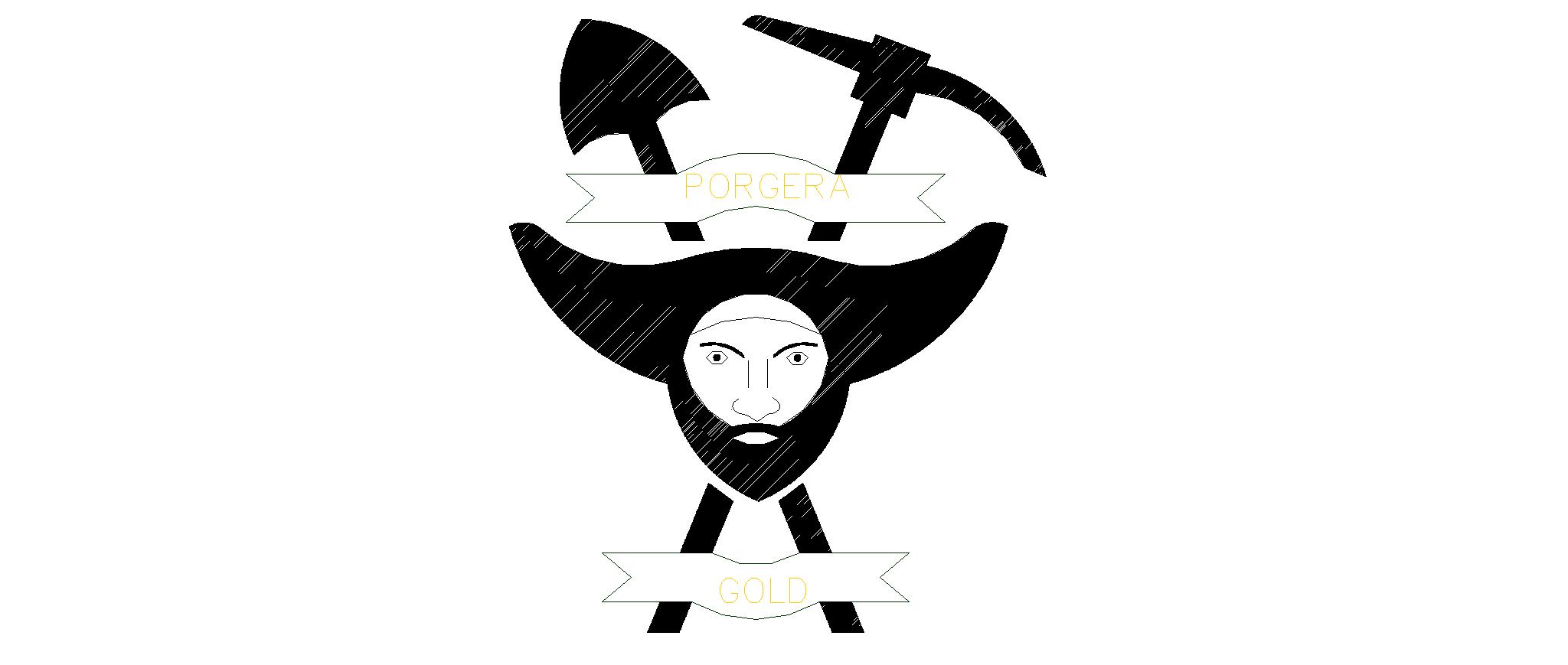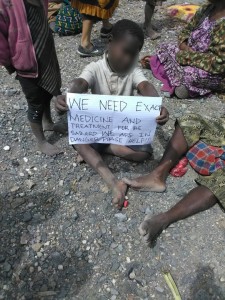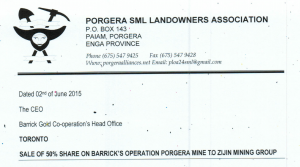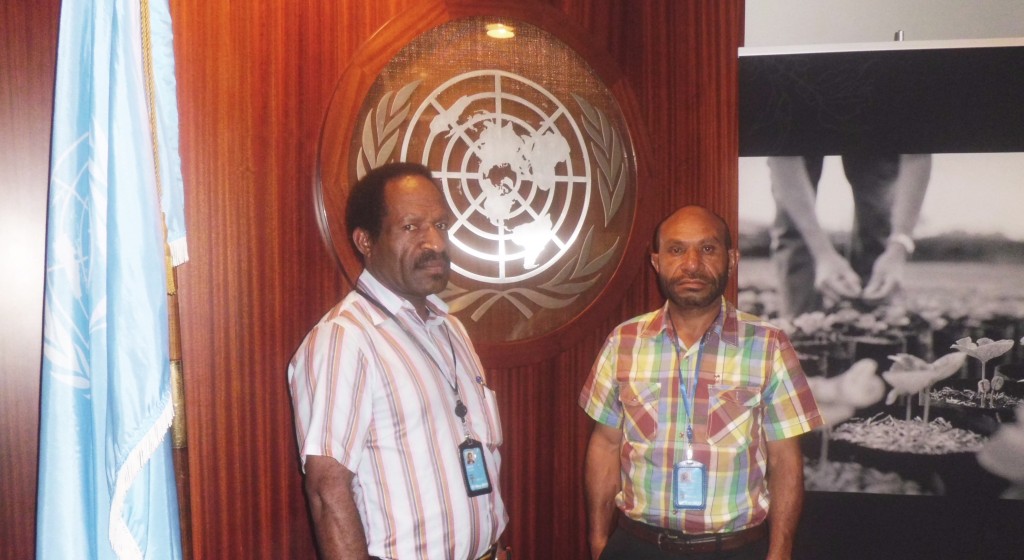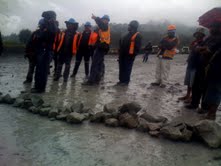On July 12, several reports from Porgera indicate that there was a chemical release by Barrick into the Red Wara River.
Category: Environment
-
Hazardous Chemical disposal in Red Wara River
UPDATE from Mark Ekepa:“In my village last week 12th July there was a shut down of mill and took 4 day to refurbished and service it while doing that the rubbish from the auto clave and unneutralized of chemicals were discharged direct into the red wara.When the villagers saw that they went down panning for waste gold as usual on their daily life and started packing them in their bags and trying to clean them with fresh water but they started feeling in their all body started heated up and itching on their skins.After an hours time the news spread around the village and Barrick PJV stepped in with their CRA officers and found out and confirmed it and took 8 victims the worse one to their medical center and treat them and took their blood samples to be tested and advices the victims to wait for two weeks to get their results.There are more victims there were burned by the chemical disposal and yet collecting their details will update you.”According to Everlyn Gaupe, over 100 victims under close attention of the medical care as a result of the release, but need proper care and resources. -
Landowners respond to 50% sale of Porgera Mine to Zijin Mining Group
The Porgera Landowners Association sent a letter to the head office of Barrick Gold outlining their concerns about the sale of 50% of their Porgera Mine stake to Zijin Mining Group. They are calling for Barrick to convene a high level delegates meeting with stakeholders of the Porgera Mine, including Zijin, so that these concerns can be addressed.
These concerns include:
- losing local employment to Chinese employees
- losing local business if the procurement process is affected
- severe damage to the environment
- lack of respect for MOA commitments
- the resettlement project could be negatively impacted
- the Fly-in, Fly-out agreement will be undermined
Read the full statement here.
-
Customary Land Rights in Papua New Guinea loses to Mining Rights in National Court Decision
Landowners appeal to United Nations for support
A recent landmark decision of the National Court that gives Porgera Joint Venture Company exclusive rights of occupancy to its Special Mining Lease (SML) could affect thousands of landowners living in major resource development project areas throughout the country. Meanwhile, landowners from Porgera have traveled to the United Nations to advocate for the humane resettlement of the people still living within the SML.
(more…) -
Background – Issues Related to Barrick Gold”™s Porgera Joint Venture Mine in Papua New Guinea May 2011
Violence Perpetrated by the Security Forces of the Porgera Joint Venture Mine
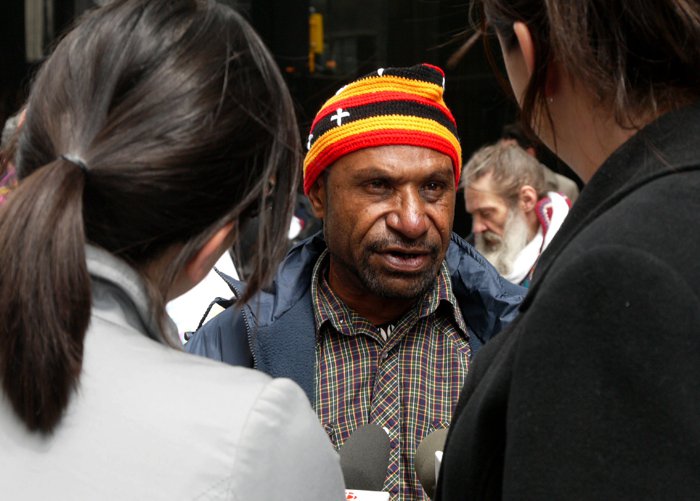
Allegations of rapes, beatings and killings of community members by Porgera Joint Venture (PJV) security forces have been prevalent for at least a decade. In a news article in 2005 then-mine operator Canada”™s Placer Dome admitted to eight killings of community members by PJV security guards. 1 Early in 2006 Barrick Gold took over the mine when it acquired Placer Dome. There have been further allegations of killings and rapes by PJV security forces since 2006. Most of these cases have never been investigated. (more…)
-
Massive Arrest – Porgera
This morning, the Porgera Mine Police arrested 45 local Porgerans
along the riverine tailings while they were panning gold. This local
landowners live in the Special mining Leased area (SML). Their homes
have not been relocated since the mine granting the Special Mining
Lease and the licence to mine. This people’s land ones used for food
gardening was taken by the mine, their traditional gold panning sites
were covered by the waste debris and sentiments from the mine, The
mine royalty obtained quarterly is insufficient amongst the growing
population. This people have no ways to cater wants and needs
especially food and drinking water. Thus this entire community is
obliged to go into the nearby mine waste tailing sites to obtain golds
to be redeemed for cash.This morning as usual the entire villagers set to the tailing mouth to
find gold and suddenly group of mine machinery police fully harmed
arrested man women kids including school students along the waste
tailing river and are locked up in cell. The remaining tribesman are
demanding the mine management to release the 45 arrested. The
villagers are blaming the mine for creating an artificial environment
which is conditioning the people go panning gold in the mine and be
arrested, raped, tortured and even get killed by the mine security
force.The situation is at tense and more shall be reported tomorrow.
Regards
Koyapal Napapen
-
STATEMENT: Brief on New Bill to Strip Rights to Land
A new law was bulldogged through the PNG Parliament last week that outlaws those third party lawsuits against resource projects in Papua New Guinea. According to Environment and Conversation Minister Benny Allan that, Environment (Amendment) Bill 2010 will supplement, give full effects to enable companies holding environmental permits to comply with the standards stated in their permit. The amendment will mitigate risks associated with third party litigation, or lawsuits. The government is claiming that recent court decision against the state exposed resource projects to the risks that environmental permits granted by the state satisfying legal and scientific requirements.
However, the indigenous landowners including us believe that the Bill strips our rights to land. The bill leaves companies and developers immune to law suits for compensation, “even if they were negligent or at fault”. This is one of the worst pieces of legislation on human rights. The bill stripped the landowners of common law and customary law rights that we have had for over 10,000 years. Multi nationals in the extractive industries cannot be sued for negligent. It does not matter even if the companies are at fault”¦. so long as the company was carrying out the activity it was authorized under the permit to do- it escapes all liability for environmental damages.
The main reason behind the government to rush the bill through, changes to sections of the Environmental Act 2000, “prevent landowners and concerned Papua New Guinean from interfering with the extractive projects.
Its sad news in our struggles but we are trying to liaise with landowners throughout Papua New Guinea to mount a high court review. We will desperately new assistance with regards to the court challenge and we will advise as and when the matter develops to reality.
Mark Tony Ekepa
Chairman
PLOA
-
Indigenous Leaders from Papua New Guinea Accuse Barrick Gold of Abuses
Four members of the Ipili tribe of Porgera in Papua New Guinea (PNG) have travelled to Canada to demand that Barrick Gold address serious human rights abuses and environmental destruction related to Barrick’s Porgera Joint Venture gold mine. Two of the Ipili are landowners and also part-owners of the Porgera Joint Venture mine.
Long-standing allegations of killings and rapes of civilians by security forces at Barrick’s PNG mine have been confirmed recently by the findings of a team of investigators from Harvard University who reported to Canadian Parliamentarians in 2009. “We have been trying to raise awareness of these killings and rapes by Barrick’s security forces for many years,” said Jethro Tulin of the Akali Tange Association, a local grassroots human rights organization. “Finally our allegations are being confirmed but Barrick is not supporting our calls for an investigation of these killings nor offering compensation to the families of those who have been killed or raped.”
Last year Barrick supported a massive military action in villages inside Barrick’s mine lease area. This military crack-down led to the forcible eviction of many citizens and the burning down of some 300 of their homes. “My house was burned down,” said Mark Ekepa, chairman of the Porgera Landowners Association and part-owner of the mine. “Barrick was complicit in the actions of the police and military and should be actively calling for an investigation as Amnesty International has recommended in its report of the house burnings.”
In 2009, the Norwegian Government divested its Pension Fund of shares in Barrick Gold as a result of findings by the fund of massive environmental damage downstream from the mine caused by the dumping of toxic mine waste into the local 800-kilometre long river system. “Our river system has been severely contaminated and is no longer safe for drinking water or for harvesting food,” said Jeffery Simon, a member of the Akali Tange Association. “This is causing a lot of hardship for villagers who rely on the rivers.”
Contamination of local water sources, lack of available land for food production, and unsafe living conditions of villagers living within the mine lease area have all become untenable. “We have made it clear to Barrick many times, most recently in our meeting with Barrick last week in Toronto, that all residents in the mine lease area must be resettled according to international standards,” said Anga Atalu, one of the landowners living in the mine lease area, “but Barrick is refusing our request.”
“The situation at the Porgera Joint Venture Mine in terms of environmental destruction and human rights abuses in which Barrick is alleged to be complicit is only possible because the Papua New Guinea government is weak and not doing its job to protect its citizens and its environment” said Catherine Coumans of MiningWatch Canada. “This is a common problem in developing countries and the effective impunity of Canadian companies in these situations can only be addressed by legislation, like Bill C-300, that would allow these citizens of Papua New Guinea to file a complaint and seek sanction in Canada for the abuses they are suffering.”
Contacts:
Mark Ekepa, Chairman, Porgera Landowners Association: emarktony(at)gmail.com
Jethro Tulin, Executive Officer, Akali Tange Association: jctulin(at)gmail.com (647) 669-4529 (cell)
Catherine Coumans, MiningWatch Canada: catherine(at)miningwatch.ca (613) 569-3439 -
Presentation by Mark Ekepa at the Canadian Parliament Press Gallary 12th May 2008
My name is Mark Ekepa. I have come from Papua New Guinea to speak to the Canadian people and the Canadian government about the problems the indigenous people in my community are facing because of the reckless mining operations of Barrick Gold”™s Porgera Joint Venture mine.
I am the Chairman of the Porgera Landowners Association. I represent the traditional landowners in Porgera where the Porgera Joint Venture mine has operated since 1990.
I am here to tell you why we cannot be safe and healthy in our ancestral land anymore.
Barrick”™s Porgera mine is disposing of millions of tons of toxic tailings (mine waste) and mountains of waste rock directly into our nearby 800 km-long river system. Barrick calls this “riverine tailings disposal.” We call it the permanent contamination of our river system. We know that this practice is illegal in Canada so we want to know why Barrick is allowed to do this to our river and nearby communities in Papua New Guinea. We used to use the river for drinking water, for food, for transportation. Now it is very dangerous. There have been consultants”™ reports since 1996 that have warned of heavy metal contamination, in particular arsenic, lead, silver, and cadmium. Our river has become a health hazard.
Also, the mine is expanding in the middle of our community and in a mountainous area. It is continuously encroaching on our homes. There is little to keep people out of the mine, or away from the dangers of its mountainous rock waste dumps, and rivers of mine tailings. We have documented many cases of people, including children, falling into the open pit, being buried by rock slides on the waste dumps and drowning during flooding in rivers of tailings. Although Barrick has recently installed a fence around the open pit itself, the pit, the waste dumps and the rivers of tailings remain accessible to the people.
Also, as the open pit has expanded and its massive waste rock dumps have grown, we have lost most of our spaces for “gardens.” This is where we grow our subsistence foods. But we have had to relocate to steeper areas where we cannot farm for our daily food.
Given all of these issues ““ as well as other human rights concerns that Jethro Tulin will tell you about – is no longer safe for us to remain on our ancestral land.
Many of the 10,000 indigenous peoples living within the mine lease area now want to be relocated. But Barrick seems to be reluctant to undertake this task. We know that Barrick has hired consultants to review the relocation possibilities but little information about the findings of these consultants is being shared by Barrick. At Barrick”™s Annual Genial Meeting on May 6th in Toronto we were told by Patrick Garver that only a few families would be moved.
This is unacceptable. Barrick has destroyed our land, our water, our safety and our ability to feed ourselves. We know that we can no longer live on our ancestral land. We know that we must leave our place so that our children can have a future. We call on Barrick and on the Canadian government to please help make the relocation of our people possible.
Thank You
